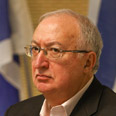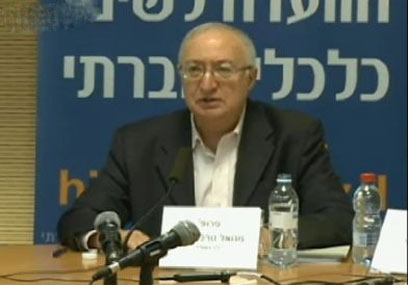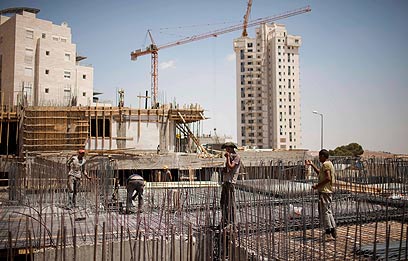
Trajtenberg Committee set to publish report
Panel to present recommendations to Netanyahu on Monday afternoon on four subjects: Housing problem, high cost of living, tax policy and quality of citizen services. What will the committee recommend and will it be accepted by the public?
The Trajtenberg Committee, which was appointed following the social tent protest to formulate a new socioeconomic agenda, will submit its report to Prime Minister Benjamin Netanyahu on Monday afternoon.
It appears that the committee's recommendations do not meet the public's expectations although the panel's chairman, Prof. Manuel Trajtenberg, claims that most of its conclusions are still unknown to the public.
Related stories:
- 'Cutting taxes may just lead to bankruptcy'
- IDF: No budget, no defense
- Housing crunch? 46,855 flats stand empty
The committee operated in a framework drawn out by Bank of Israel Governor Stanley Fischer, which included four sub-committees that each dealt with a different subject: The housing problem, high cost of living, tax policy and quality of citizen services – especially education.
Prof. Manuel Trajtenberg (Photo: Courtesy)
The team was comprised of 14 economists and civil servants who met with hundreds of people: Citizens who testified before the committee about what they perceive as the central social ills in Israel, professionals who provided advice and government officials who examined the different alternatives that had been suggested by the committee, while providing their opinion about each plan's efficiency and cost.
Housing: Entrepreneurs will benefit
From a first glance at the committee's recommendations, it appears that the main benefactors will be the entrepreneurs and the contractors. The panel's recommendations include a variety of benefits that aim to encourage construction companies to build more housing units, in addition to several penalties to those who own land or apartments but do not use them, such as doubling the property tax.
Among the committee's recommendations are state-subsidized land, tax benefits, greater flexibility in building standards and the removal of public objections.
The committee also recommended allocating an additional NIS 160 million ($43 million) for public housing, NIS 30 million ($8 million) to promote evacuation-construction initiatives and another NIS 250 million ($67 million) to improve infrastructure in the Arab sector.
Contractors set to benefit (Photo: AP)
As for achievable housing solutions, the panel approved the prime minister's three recommendations – already declared before the committee was established: building 10,000 housing units for students on unused land in cities, allocating land for half price to buildings that will take part in special housing initiatives, in addition to projects of housing units for rent at a reasonable price.
However, the committee did not rule on the matter of eligibility for an apartment in the different projects. Traditionally, criteria for participation in special project tenders benefit the haredi population: Sixty percent of the apartments are allocated in advance to families with more than four children while there is no allocation for apartments for singles. Achievable housing also does not have eligibility criteria today and is therefore not implemented.
The committee discussed the possibility to allow participation in the tender only to those who served in the army and who can provide proof of their ability to earn a salary. However, it did not reach an encompassing decision, probably so as not to present Netanyahu with a done deal that would create friction with the Shas party, which controls the Housing Ministry.
Instead, the committee provided an optional recommendation by which in the projects of monitored housing for rent, only those who earn a monthly salary that does not exceed NIS 17,666 ($4,770) before taxes and do not own property would be eligible.
Taxes: Direct taxes will go up, Indirect taxes won't
The committee will recommend freezing the framework of reducing companies' tax. It is also likely to suggest freezing the framework of income tax reduction as well.
In addition, tax on capital profit will increase, most likely to 25% while a new tax level will be added to those who earn above NIS 50,000 ($13,500) a month.
The committee has therefore dealt with a demand that was raised during the social protest, urging a halt to the progressive tax reduction policy in Israel – a policy that has cost the state billions of shekels in recent years, indirectly resulting in the raising of taxes the entire population pays on products - value added tax (VAT), gas tax, cigarette tax and more.
Social protestors in Jerusalem (Photo: Gil Yohanan)
The other aspect of the demand to change the tax mix – using the increase in direct tax to reduce the taxes on products – is not expected to be included in the Trajtenberg committee's recommendations.
The panel examined the possibility to reduce the rate of indirect taxes but its members concluded that the cost of such measures would be too high while the benefit to the private citizen – according to sources in the committee – would be too low.
Therefore, Israeli citizens are likely to pay more taxes. The only perk that appears to be added is adding tax points to fathers who have young children.
Citizen services: Free education from age of 3
Increased taxes and the already approved cut in the defense budget will add NIS 10 billion ($2.5 billion) to the State, which will help finance improved citizen services. It appears that the main perk in this area will be the implementation of the free education law from the age of three.
The law was legislated in 1984 but was piled under the Arrangements Bill from 1985 until 2008 on the pretext of a lack of financial sources to fund it. Since 2009, it is partially implemented as only 30% of students enjoy it today, mainly in the periphery. In addition, the committee will recommend gradually implementing a long school day.
Families protest high cost of raising young children in Israel (Photo: Amir Erez)
Cost of living: Will tax on imports be cancelled?
In recent days, sources around the committee are talking about a dramatic recommendation to cancel all customs on imports (food products, electrical products, cars and more), in order to open the Israeli market to competition which will help lower prices.
At present, it appears that this step will indeed be part of the committee's recommendations, despite threats from the representatives of the industrialists, who argue that it would cause plants to shut down, resulting in mass layoffs.
However, sources in the Finance Ministry claim that the scope of this move must not be exaggerated when it comes to its effect on state earnings. The encompassing cancellation of customs was approved rather easily after the Tax Authority examined the issue and found that the earnings from customs on imports was not high and that the cost of canceling it was relatively low. The state's earnings from customs in 2010 was NIS 2.7 billion ($730 million), whereas complete earnings during that year was NIS 195 billion ($52 billion).
The Treasury is concerned by the ramifications of canceling customs on imports and exactly to what extent will prices be cut, at least in some branches.
The customs on imports are used, among other things, by the state as bargaining chips during trade agreements negotiations with different countries. In recent weeks, the ramifications of canceling the customs on imports were examined in relation to trade agreements and the extent of harm it would inflict on Israeli exporters who are protected by these agreements.
In addition, steps are being examined that would protect the Israeli consumer from the "flooding" phenomenon in which foreign manufactures initially sell at a loss to crumble Israeli competitors, and then later, when there is no more competition, raise prices unlimitedly.
- Follow Ynetnews on Facebook
- Receive Ynetnews updates directly to your desktop














